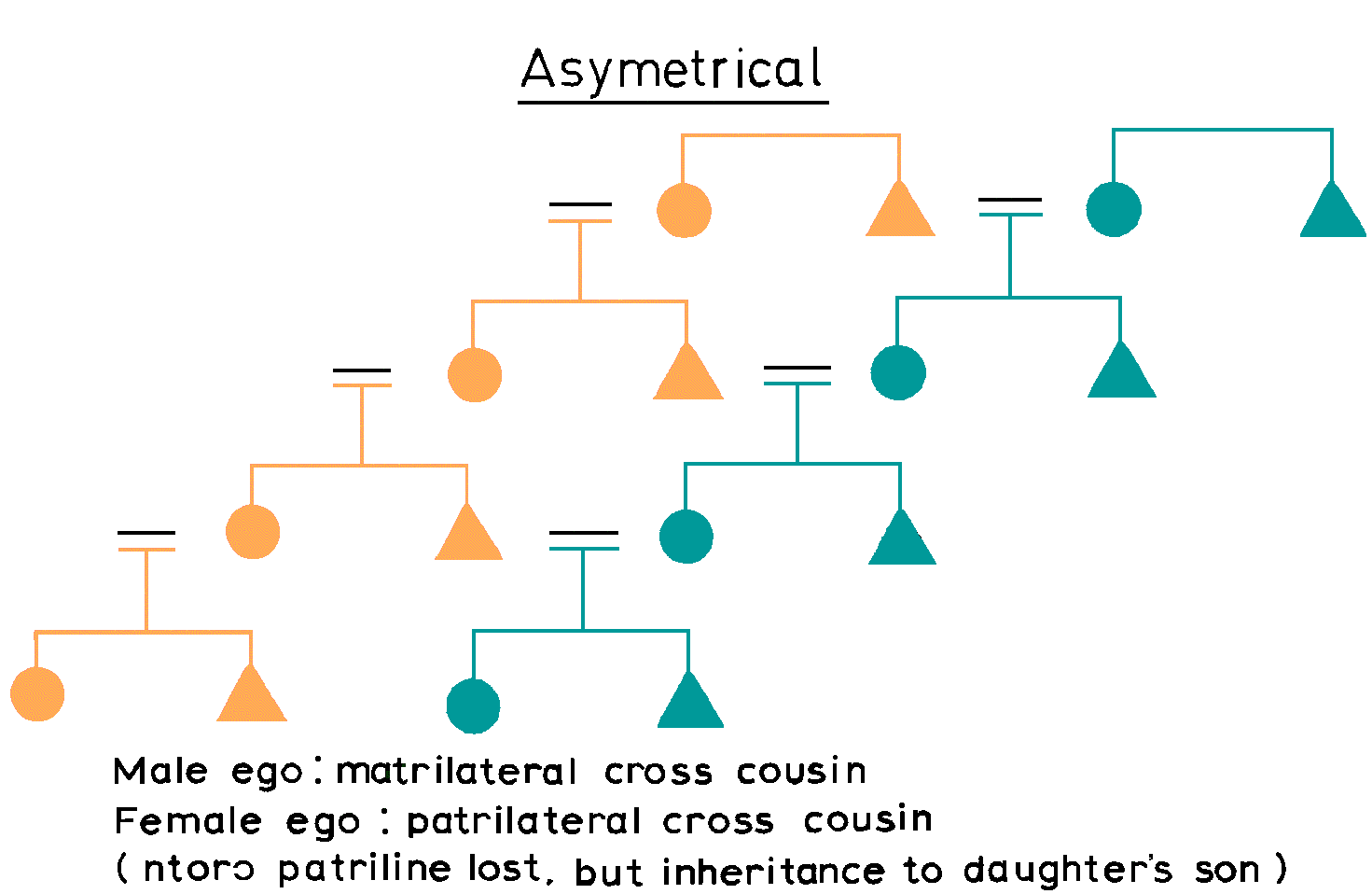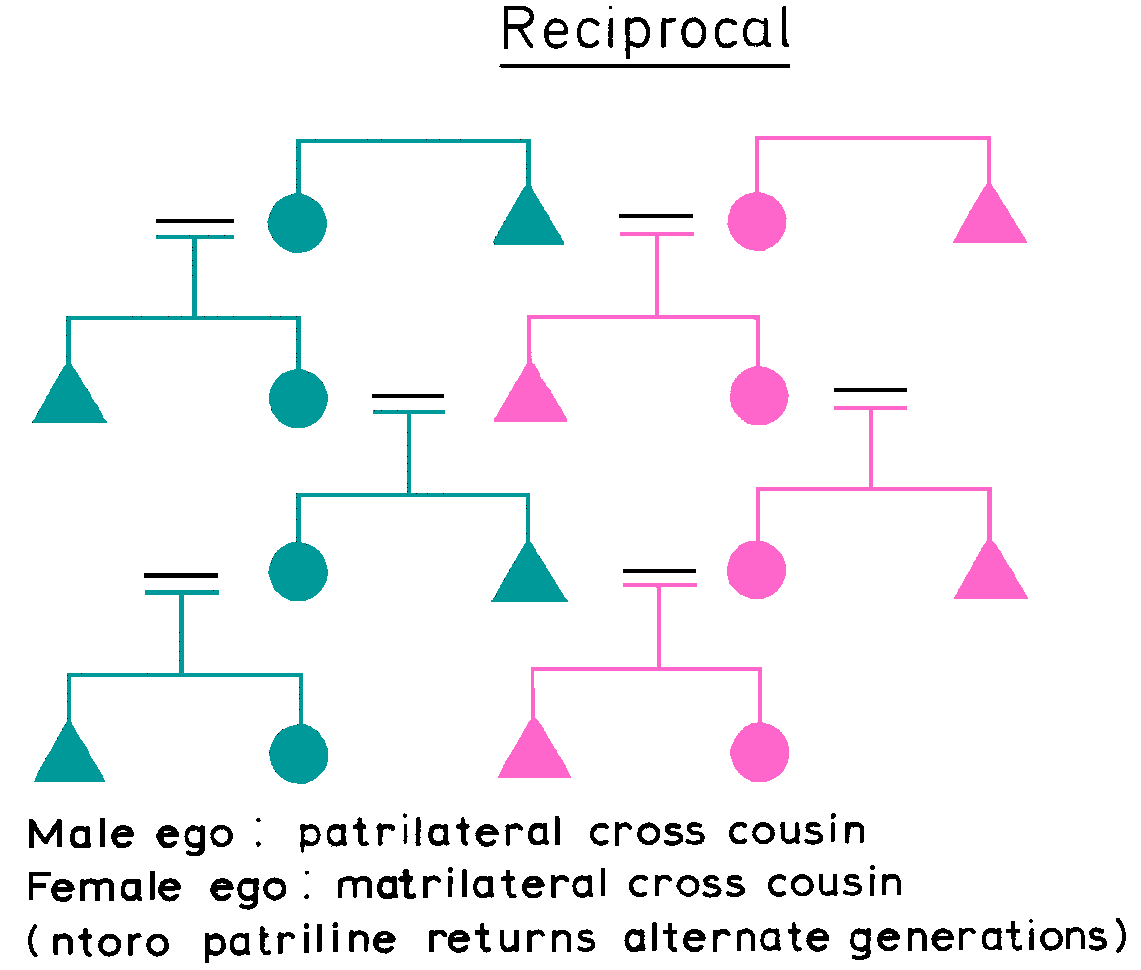Translations:
Other Pages:
CEC Training Modules
Akan Studies Site Map
Sociology for beginners
Contact
Kompan Adepa
Go to the People
Ghana Web
Cross Cousin Marriage
by Phil Bartle, PhD
In Akan society, a matrilineal descent group, abusua, is exogamous. That means members must marry outside the group. That, in turn, means a husband and wife must belong to different descent groups. A father belongs to a different descent group from those of his children. By this calculation, a cross cousin, child of mother's brother, or child of father's sister, is marriageable. In many unilineal descent groups such cross cousins are often preferred spouses.
A cross cousin is the child of one's parent's sibling of the alternate sex. A cross cousin is contrasted with a parallel cousin, who is seen as a brother or sister, eg a child of a mother's sister or child of a father's brother. Marriage with a parallel cousin would be seen as incestuous.
In a matrilineal society, there are two kinds of cross cousin marriage.
As time passes, arranged marriages are decreasing in frequency, and cross cousin marriage is decreasing as a preferred kind of marriage.
The two kinds of cross cousin marriage are: (1) asymmetrical and (2) reciprocal. The easiest way to describe them is to use diagrams. Here a circle represents a woman, a triangle represents a male, an equal sign represents marriage or conjugal relationship, vertical lines represent descent and horizontal lines represent sibling relationships.
 |
The asymmetrical cross cousin marriage, if repeated over generations, requires an agreement between two matrilineages. This is a pattern closely related to the Akan confederation for forming towns or states, or major divisions within states. The lineage, in the above diagram portrayed on the right, always provides the wife in this arrangement. The other lineage, as in the one on the left above, always provides the husband. The chief's lineage is said to be married to each of the lineages in the confederation. When I studied Obo, the Obo chief had 32 wives. In practice he had conjugal relations only with the wife he married before he was enstooled as a chief. The mainly elderly women, who are among his structural wives today, take the arrangement as a form of old age security. Custom requires that if such a wife dies, then the lineage must provide a replacement to become the wife of the chief.
In the above diagram, the people coloured orange would be in lineage A, the chief's lineage, while those coloured blue would be in lineage B, the lineage member of the confederation.
The second type of cross cousin marriage is reciprocal. Again it is a relationship between two lineages, but this time in each alternating generation each lineage provides first a husband then a wife.
 |
The reciprocal pattern serves two functions, one economic and one political. When a man acquires wealth in his lifetime, he is interested in supporting his sons. At death, however, there are three things that follow the mothers' lines: inheritance, succession and descent. If he invests in his son, building up capital for a business or a cocoa farm, that wealth will go to the son's lineage. If his son marries his sister's daughter, however, it will return to his own lineage. That is the economic component.
Kinship terminology adds some meaning to this arrangement. That son would use the word for "female father" to address his father's sister (siwa or agyewa). The same word is modified slightly to mean "mother in law."
In the above diagram, the people coloured blue would be in lineage B, and those coloured pink would be in lineage C.
The political component goes back to the spiritual patriline, inherited from the Guan culture and society that occupied the land before the Akan did. When an important elder or chief dies, his lineage must of course choose a successor from within their own matrilineal descent group. Less well known, also, is that they try to find a successor who has the same spirit patriline. The chief of Obo, for example, is more likely to be chosen as such if he has the "Amu" spirit patriline, related to the Tano god which is the stool god of Obo. Knowing that bit of information is important to other chiefs, elders and priests, who demonstrate their knowledge when the chief says "good morning" or "good afternoon" and that person replies with "Yaa amu," demonstrating that he knows the Obo chief has the Amu spirit patriline.
As time passes and societies change, the urbanization, westernisation and modernization of Kwawu society means that more people are choosing spouses outside the home town and outside Kwawu, fewer persons adhere to the wishes and desires of their elders, and thus cross cousin marriage is declining. Because the law of the land, Ghana, recognises traditional land usage, where the matrilineal descent group owns land corporately, chieftaincy and the institutions which accompany matrilineal descent, such as cross cousin marriage, do live on.
Note:
 |
Files in the Social Organization set: |